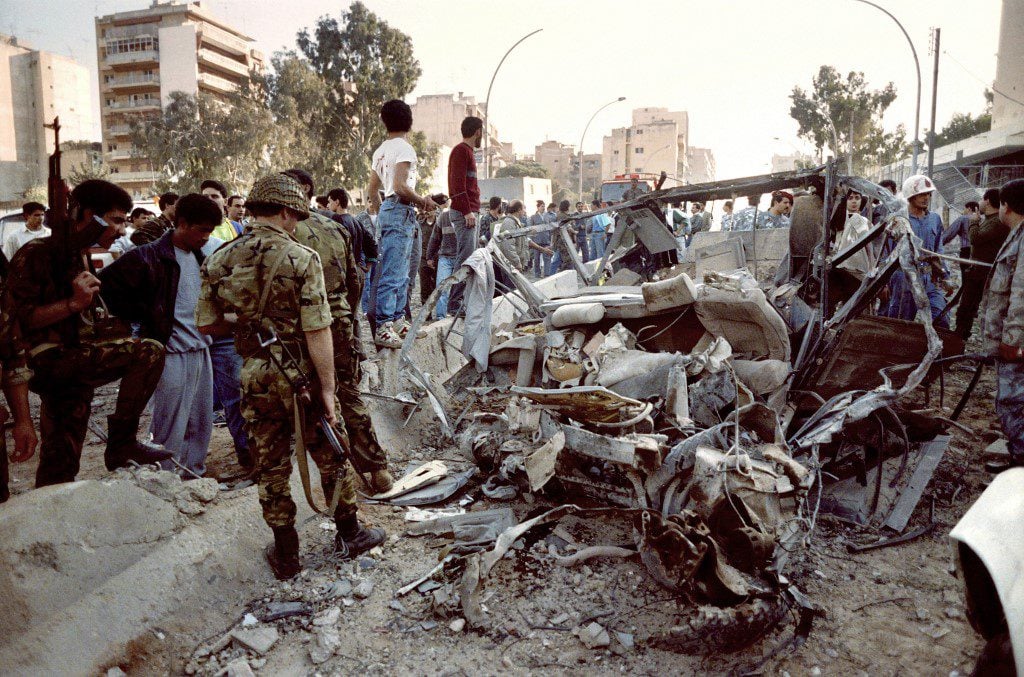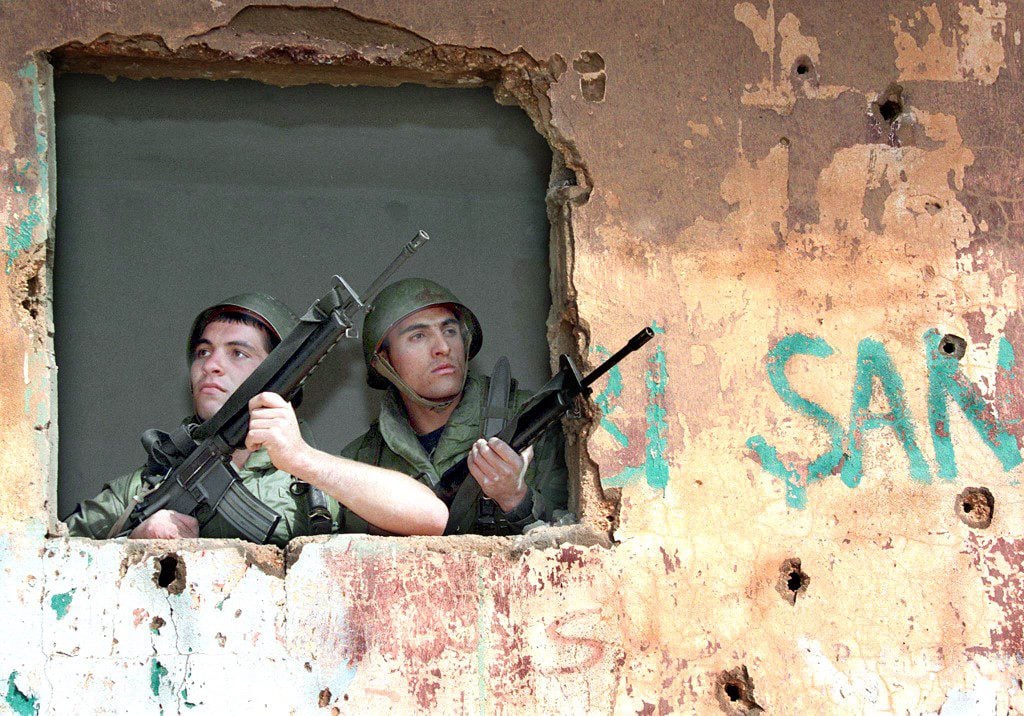33 years after the end of the Lebanese civil war, the idea of another civil war still haunts the Lebanese people due to many political and economic factors.

Ali al-Ajeel
Many years have passed since the Lebanese Civil War. However, the notion of another civil war still haunts the Lebanese people.
The fear of another civil war continues to worry Lebanese society, especially civil society activists who, due to the many disturbances and upheavals Lebanon has experienced recently, see it as a looming possibility.
The deteriorating economic state and the collapse of the Lebanese lira are the main reasons for people’s concerns. On top of that, recent events in areas that witnessed the civil war have raised alarm bells. For example, clashes in the Tayouneh neighbourhood of Beirut two years ago brought back memories of Lebanon’s darkest and most bitter days.
In this context, Fanack conducted interviews with numerous Lebanese people to understand their perspectives, listen to their stories and better understand the lingering impact of the civil war on Lebanese society.
ِA Civil War
According to Adham Sulieman, a resident of Beirut, most people agree that another civil war must be avoided. “We don’t have the luxury of talking about war right now. The Lebanese struggle with hunger, poverty, resource scarcity and the ongoing economic crisis. Any talk of war would only add insult to injury,” he stated.
For over three years, Lebanon has been facing an economic crisis that has led to a record collapse of the Lebanese lira against the US dollar. This crisis has also resulted in shortages of essential items such as fuel, medicine and food.
Echoing this sentiment, Janu Barkat, a master’s degree holder in economic and development communication, added, “The economic crisis has left people exhausted and preoccupied with securing their basic needs. However, it has also intensified their sectarian and political prejudice.”
Janu clarifies, “I am not referring to the educated or open-minded class who are accepting of others. Rather, I am referring to those who fundamentally reject the other and pass this mindset on to their children. For instance, Bashir Gemayel is still hailed as a hero by the Lebanese Phalanges Party (al-Kataeb) but is viewed as a traitor by the Syrian Social Nationalist Party.”
When asked whether people could easily be lured into a new war, Janu replied, “If the leaders desired a new war and secured the necessary weapons and ammunition, people would engage in it without a second thought.”
Janu noted that there is hatred towards Syrian refugees, which she believes is due to a rumour that UN aid provided to Syrians is in US dollars. “This rumour was the trigger. Lebanese citizens are frustrated and let out their anger on Syrian refugees while forgetting who is actually stealing their country’s riches and causing these financial losses,” she explained.
According to Janu, the real issue lies in the “false sense of adaptability” that guides people’s actions. She was taken aback by “the Lebanese people’s ability to adjust to all sorts of crises and even a hypothetical new war while being unable to let go of the past war and come to terms with what happened.”
A Ticking Bomb

The Lebanese civil war was not just a conflict among the Lebanese but also a proxy war on Lebanese soil. Divisions, massacres and religious polarisation were characteristic of this turbulent period. According to Ramy M., a Lebanese professor, this contributed to the fragmentation of society and the ongoing sectarianism. He argued, “Only political parties capitalise on such sectarianism, exploiting it to fuel hatred when it serves their interests.”
Ramy added, “While most Lebanese citizens are unwilling to take up arms and relive the horrors of war, some parties are willing to drag the country into limited regional conflicts if need be. These parties exploit the lingering differences among the Lebanese population.”
The political system in Lebanon is based on the distribution of key positions among different religious sects. The president must be a Maronite Christian, the prime minister a Sunni Muslim, and a Shiite Muslim must lead the parliament.
Sam Youssef, a resident of Brimana, attributes this sectarian allocation to upbringing. He told Fanack, “Families continue to instil sectarianism and fear of the ‘other’, differences and regional boundaries in the younger generation. The war will not end until these ideas change.”
The Missing Persons Issue
Despite 48 years having passed since the start of the civil war, families of the missing continue their struggle to uncover the fate of their loved ones.
While the war officially ended with the “Taif Accords,” its impact on the families of the missing persists. Samia K., the 83-year-old mother of one of the missing, asserts that these families are fighting to keep their cause alive. She added, “The war will not end for us until we discover our sons’ fates or at least locate their graves.”
Social activist Reem S. stressed the importance of raising awareness regarding the issue of missing people, not only on public occasions such as the civil war’s commemoration and the International Day of the Disappeared but also through continuous demands for answers.
Since 2011, the International Committee of the Red Cross has catered to these families’ needs and demands, including through legal and psychological aid and by striving to obtain social recognition of their plight and suffering.
Syrian Refugees
Syrian refugees in Lebanon are subjected to numerous accusations and incitement, often becoming the target of scrutiny and anger when tragedies or problems come down on the Lebanese.
Mohammed L., a Syrian refugee in Tripoli, asserts that the societal perception of Syrians in Lebanon has remained unchanged since the war. He told Fanack, “If any Syrian resident of Lebanon misbehaves, the perception will extend to all of us. This could escalate to dangerous levels. And the only solution, according to the Lebanese citizen, is for us to return to Syria.”
Lawyer N.D. confirmed this sentiment to Fanack, noting that most of Lebanese society believes that refugees, even children, are guilty of their ancestors’ sins. There is a fear that they could become soldiers against Lebanon if any harm befalls the country.
She added, “The Syrian refugee is now bearing the cost of what the Syrian Arab Army did in Lebanon. The army came to Lebanon as a deterrent, and in the Lebanese perception, only worsened the situation, especially in terms of the missing persons’ issue.” She said, “The relationship between Syrians and the Lebanese is complex and requires a joint solution.”
Women and Feminism
The feminist movement views the impact of war on women differently. They argue that women bear the brunt of war, particularly since they are often tasked with preserving the family in the absence of men and repairing the torn social fabric.
Social activist Sarah H. told Fanack, “Women played a critical role in advocating for political and human rights during the civil war. They organised popular movements to end the conflict.”
She added, “Women’s fundamental role was to reject civil war and fight against it through various means, including demonstrations, writing and their socio-political activities.”
However, Sarah noted that society remains masculine, with exclusively male “martyrs” and leaders such as Bachir Gemayel, Michel Aoun, Samir Geagea, Walid Jumblatt, Nabih Berri, and Hezbollah’s and Axis’ leaders. She adds, “In contrast, women’s roles are often diminished to representations in the media of mothers carrying pictures of their missing sons, widows mourning in the streets of Beirut and women fleeing from bombings.”
Background

The Lebanese Civil War began on April 13, 1975, with clashes erupting in Beirut before spreading to other parts of the country. The conflict did not stop until Lebanese MPs reached an agreement in Taif, Saudi Arabia, in late 1990, known as the Taif Agreement.
The war, which lasted over 15 years, shattered the Lebanese dream of making their country the “Switzerland of the Middle East,” a vision pursued for two decades prior to the war.
The War’s Triggers
Before 1975, the country was ripe for a civil war due to widespread poverty, deteriorating living conditions and sectarian and political divisions. Palestinian attacks on Israeli forces from Lebanese territory only worsened these divisions.
The war’s main trigger was the shooting of a bus carrying Palestinians in the Ain El Remmaneh area of Beirut by members of the Kataeb party in response to an assassination attempt on their leader Pierre Gemayel. In its aftermath, all Lebanese sects and classes were pulled into the conflict, either as participants or victims.
The Taif Accords
The Taif Conference was held in 1989 and was attended by 62 Lebanese MPs representing the major warring parties, including the Amal Movement, the Progressive Socialist Party, the Lebanese Forces and the Kataeb Party.
The attendees signed the Taif Agreement, ending the Lebanese Civil War. The parliament elected Renne Mhawad as president, but he was assassinated just 16 days after his election and was succeeded by Elias El Hraoui.
In March 1991, a law was passed granting amnesty for all crimes committed since 1975, officially ending the war between the opposing factions. All militias were disbanded, and the process of building a non-sectarian national army, the Lebanese Army, began.
The Outcome of the War
The Lebanese Civil War has had long-lasting effects that remain visible today, such as the displacement and redistribution of the population based on religious and sectarian affiliation.
The war resulted in over 150,000 deaths, 300,000 injuries, 17,000 missing persons, and over a million displaced people from Christian and Muslim towns and villages.
Since the Taif Agreement, the power-sharing equation has been based on sectarian distribution, with Christians, Sunnis, and Shiites sharing key positions. In addition to its human casualties, the war significantly impacted the country’s infrastructure and private and public sectors, with an estimated cost of billions of dollars in losses.


